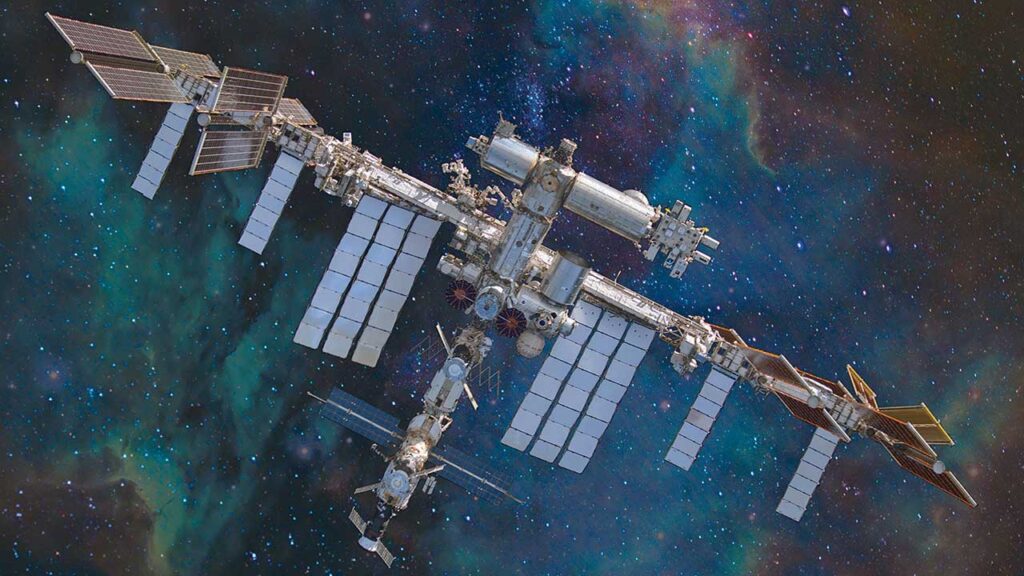January 2025
Welcome to Space Station Spotlight, a monthly newsletter from the ISS National Laboratory®. Here’s where you can find all the latest R&D happenings on the space station, see what our partners are up to, and learn how to elevate your research to new heights by leveraging the unique space environment.
What’s new at the ISS National Lab?

Learn about the many successes this past fiscal year—a record-breaking number of published results, more than 100 payloads delivered to station, new multiflight cancer research funded through Igniting Innovation, and more. Read the full Annual Report.

The piece, authored by Davide Marotta, ISSInternational Space Station National Lab program director for in-space biomanufacturing, discusses the benefits of space-based research on neurodegenerative diseases and highlights research on neural organoids in microgravityThe condition of perceived weightlessness created when an object is in free fall, for example when an object is in orbital motion. Microgravity alters many observable phenomena within the physical and life sciences, allowing scientists to study things in ways not possible on Earth. The International Space Station provides access to a persistent microgravity environment.. Read more.
Partner News
Axiom Space announced a new collaboration agreement with the Turkish Space Agency (TUA). The two will collaborate to develop supply chain opportunities for Turkey’s space industry, focusing on potential contributions to the planned Axiom Station.
Bill Nelson stepped down as NASANational Aeronautics and Space Administration administrator, ending his 50 years of public service. President Trump appointed Janet Petro, director of Kennedy Space Center, as NASA’s interim chief.
Blue Origin’s New Glenn rocket had a successful inaugural flight. This was Blue Origin’s first orbital launch, and New Glenn will become the newest heavy-lift rocket, increasing launch capabilities.
Redwire Corporation announced its acquisition of Edge Autonomy. Following the merger, Edge Autonomy—a leading provider of uncrewed airborne system technology—and its subsidiaries would be wholly owned subsidiaries of Redwire.
Sierra Space CEO Time Vice retired from the company. Sierra Space chair Fatih Ozmen will step in as CEO, and his wife Eren will serve as president. The couple has owned Sierra’s former parent company since 1994.
Starlab Space announced a European subsidiary in Germany. The startup—a joint venture between Voyager Space, Airbus, Mitsubishi Corporation, and MDA Space—is one of the companies working on a commercial space station as part of NASA’s Commercial Low Earth Orbit(Abbreviation: LEO) The orbit around the Earth that extends up to an altitude of 2,000 km (1,200 miles) from Earth’s surface. The International Space Station’s orbit is in LEO, at an altitude of approximately 250 miles. Destinations (CLD(Abbreviation: CLD) CLDs are commercially owned and operated platforms in low Earth orbit as part of the NASA CLD Program. NASA intends for there to be a continuity of space-based research from the International Space Station to these new commercial platforms as they are ready.) program.
Voyager Technologies filed for an initial public offering in the U.S. The number of shares and price range have not yet been determined. The company, previously Voyager Space, recently announced a rebrand to emphasize its broader focus, including a Defense and National Security division and its Starlab Space Stations and Space Solutions divisions.
Funding Opportunities

An ISS National Lab research announcement on technology advancement is open. Through this opportunity, researchers can propose to use the space station to develop, test, or mature products or processes. Concept summaries are due on March 3, 2025. See full details here.
An NSF-funded solicitation for physical science R&D leveraging the ISS National Lab opened. NSF will provide up to $3.6 million for projects that study fluid dynamics, particulate and multiphase processes, thermal transport processes, combustion and fire systems, and nanoscale interactions in space. Interested investigators must submit a Feasibility Review Form by February 5, 2025. See the full details here.
Results
The most recent issue of Upward®, official magazine of the ISS National Lab, is online. Explore valuable findings from space-based R&D—download the current and past issues here.
Emory University researchers published cardiac research results in a high-impact journal. The findings, published in Biomaterials, could help advance cell therapies for heart disease by enabling the production of heart muscle cells that can better survive transplantation into a patient.
Rensselaer Polytechnic Institute researchers published results related to an NSF-funded physical science project. The project aims to develop fluid dynamic models to describe the flow of various types of proteins in solution under a wide range of flow conditions. The findings, published in Physical Review E, could help improve pharmaceutical manufacturing.
The ISS National Lab highlighted a record year of results from space-based R&D. See how published findings lay a robust foundation for ongoing scientific advancements that promise significant benefits for humanity. Read about some of the most transformative investigations highlighted in Upward this past year.

Workforce Development and STEM Education

Hundreds of students will have the chance to explore space, science, and innovation through hands-on learning experiences that will empower the space leaders of tomorrow.
Save The Date
The 2025 ISS Research and Development Conference (ISSRDC(Abbreviation: ISSRDC) The only conference dedicated exclusively to showcasing how the International Space Station is advancing science and technology and enabling a robust and sustainable market in LEO. This annual conference brings together leaders from the commercial sector, U.S. government agencies, and academic communities to foster innovation and discovery onboard the space station. ISSRDC is hosted by the Center for the Advancement of Science in Space, manager of the ISS National Lab; NASA; and the American Astronautical Society.) will be held in Seattle July 28-31. Join us for the 14th annual ISSRDC, the only conference dedicated exclusively to showcasing how the ISS advances science and technology development.
Make a Stellar Impact With a Donation to the ISS National Lab
Want to make an impact and support science in space for the benefit of humanity? Click here to donate online, make a gift of crypto or stock, or contribute through your donor-advised fund.

